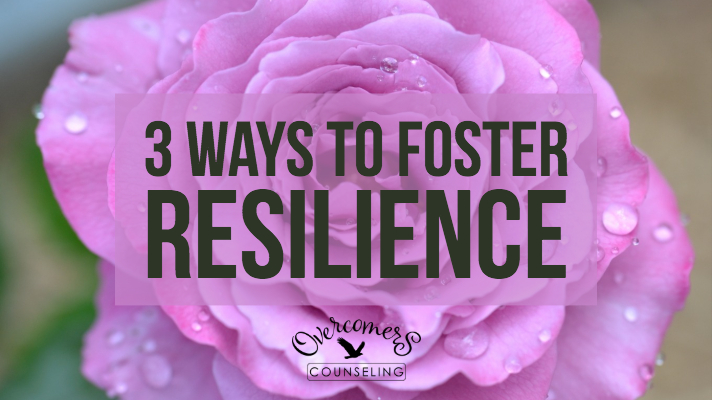Raindrops on roses
And whiskers on kittens
Bright copper kettles and warm woolen mittens
Brown paper packages tied up with strings
These are a few of my favorite things
Girls in white dresses with blue satin sashes
Snowflakes that stay on my nose and eyelashes
Silver-white winters that melt into springs
These are a few of my favorite things
When the dog bites
When the bee stings
When I'm feeling sad
I simply remember my favorite things
And then I don't feel so bad
As a child with pediatric brain cancer, I recall listening to this song while in the hospital over and over to get through the many struggles I encountered.
This song describes something that psychologists and counselors study and try to impart during therapy… the impact of our thoughts on our feelings and overall mood.
Here I examine 3 ways to foster this resilience and pattern of thinking including developing an optimistic outlook through interventions such as cognitive behavioral therapy,meditating on scripture and using imagery and mindfulness to foster psychological well-being.
More...
Whether we are going through a chronic illness, dealing with financial problems or dealing with a disability, we each possess the key to resilience and happiness in the midst of adversity. We are able to thing thoughts and rehearse words to find strength and courage in the worst circumstances.
The Power of Positive Thinking
Winston Churchill said, “A pessimist sees the difficulty in every opportunity; an optimist sees the opportunity in every difficulty,”
According to Webster’s dictionary optimism is:
1: a doctrine that this world is the best possible world."
2: an inclination to put the most favorable construction upon actions and events or to anticipate the best possible outcome
I often talk to clients about creating a fence for their thoughts. Based on this definition, the optimistic individual creates a thought fence that allows him or her to ignore negative evidence and get encouragement from positive influences.
Optimists:
- Choose to dwell on positive subjects and choose to believe evidence that supports a favorable outcome
- develop a “thought fence” that only allows for favorable interpretations and conclusions
Cognitive Behavioral Therapy (CBT) is a type of counseling therapy in which the therapist works with the client to modify his or her beliefs about their situation to change the way they react and respond to events and circumstances.
Using cognitive behavioral therapy (CBT) I assist the individual by disputing negative thoughts and perceptions. I teach them to recognize faulty thought patterns and help them develop a more healthy outlook on their situation.
Cognitive Behavioral Therapy (CBT):
- helping the subject change their thoughts to productive, positive cognitions.
Meditating on Scripture and Other Positive Messages
Anyone who worried in the past about a situation understands the concept of meditation. When we meditate on something, we examine it closely and rehearse it mentally and focus on its various angles and components.
In Isaiah 40:31 we see the role of waiting on the Lord and meditating to receive strength and direction.
”They that wait upon the Lord shall renew their strength. they shall mount up with wings as eagles;They shall run and not be weary; they shall walk and not faint."
In Joshua 1:8 we see the role of speaking scripture and meditating on God’s word.
“This book of the law shall not depart out of thy mouth; but thou shalt meditate therein day and night… for then thou shalt make thy way prosperous, and then thou shalt have good success”
Facing our fears through scripture and positive thoughts
When I look back on my experience of childhood brain cancer, I realize that my thoughts played an important role in overcoming my diagnosis.
I remember preparing for brain surgery and telling myself that everything would be ok with thoughts such as, “I’ve had surgery before and everything was ok afterwards, so this will also turn out good,”
I also remember seizures and rehearsing the thought, ” this always stops eventually, and it will eventually stop once again,”
Another thought I rehearsed over and over again was a statement my mom made after I lost my sight, “you can still do all of the things you wanted to do before, You’re just going to have to learn to do things differently now.”
I also remember listening to hours of healing scriptures. I believe this played an important role in overcoming what the doctors called “terminal cancer”.
When facing fear, one can rehearse scriptures such as II Timothy 1:7
God hasn’t given us a spirit of fear, but of power, love and a sound mind.
Topical Bibles are an amazing resource to help you find scriptures that apply to your situation Find scriptures to help you and meditate on the scriptures day and night. For an online topical Bible, go to https://www.biblestudytools.com/topical-verses/
For a psychologically proven and more secular approach, one can look to the concepts of Imagery and Mindfulness to gain a sense of peace in the middle of adversity.
Yoga often incorporates these concepts to improve the person's state of mind.
These techniques can be taught during therapy or found through books or online resources.
Examples of these techniques include Progressive Muscle Relaxation (PMR), Deep Breathing and Guided Imagery.
I often incorporate Christian hymns or prayer to give a more Christian slant to these interventions. Learn more about my style of therapy at https://www.counselingbykimberly.com/2017-3-28-guiding-principles-for-an-overcomer/
In conclusion, in this blog I described ways to foster positive thinking and resilience using concepts that include:optimism, cognitive behavior therapy, .meditating on Bible scripture and other positive messages and using meditation and mindfulness to encourage a sense of peace and relaxation
- Face scary situations by thinking positive thoughts.
- Look for something positive in every situation, and you will be more courageous and brave no matter what you are facing
- Meditate on scriptures that apply to your situation
- Use resources such as a topical Bible to find scriptures to help you with various types of problems
Resources:
- Some online resources on mindfulness and other relaxation techniques can be found at https://students.dartmouth.edu/wellness-center/wellness-mindfulness/relaxation-downloads#deep
- Read more from me on the role of faith to overcome at https://www.counselingbykimberly.com/2017-8-27-how-does-my-faith-help-me-overcome-my-problems/
- Read about other ways to face adversity at https://www.counselingbykimberly.com/2017-7-27-3-steps-for-overcoming-adversity/
- Learn more about my style of therapy at https://www.counselingbykimberly.com/2017-3-28-guiding-principles-for-an-overcomer/


